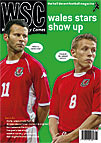 The FA's permanent fixture, David Davies, has been left in charge of the shop again. Philip Cornwall reflects on a career that defies logical explanation
The FA's permanent fixture, David Davies, has been left in charge of the shop again. Philip Cornwall reflects on a career that defies logical explanation
Amid the swirl of crisis at Soho Square, with the departures of Adam Crozier, Frank Pattison and Howard Wilkinson and the (so far false) rumours about Sven-Goran Eriksson, one man still stands. David Davies’s second term as acting chief executive of the Football Association, this time in joint control with Nic Coward, marks him down as a great survivor.
It’s a remarkable development, given that he came to the FA in 1994 as director of public affairs (or press officer, as UEFA’s website still calls him) when the FA needed a firm public face to deal with the bung scandals. Davies was a TV reporter and presenter, a veteran of Grandstand, Look North West and Midlands Today. His big contribution to football culture, beyond endless reports from Loftus Road, just across the way from Television Centre, was the catchphrase: “If you don’t want to know the score, look away now.”
The man he worked with from 1994 to 1996, revamping the FA’s press relations, was the former Daily Express man Mike Parry. Today, one of them is Alan Brazil’s loud-mouthed side-kick on Talksport’s breakfast show; the other is in charge of the national game.
If that isn’t enough to make you scratch your head, then consider Davies’s record at the FA. The current crisis, at least, cannot be considered his fault. Crozier’s confrontation with the Premier League chairmen was all of his own making. Davies gets on well with the England coach, and his temporary appointment seems to have reassured Eriksson. But the succession of events that led to the Swede’s appointment are a different matter. It was Davies who was responsible for the biggest PR disaster ever to befall an England manager or coach – and he’s runner-up, too.
Co-authoring Glenn Hoddle’s World Cup Diary was bad enough, but Davies takes the top prize for his involvement in the policy of encouraging Hoddle to repair his relationship with the media by giving more open interviews. Ones in which he could talk about his personal philosophy, for example. Of course, on top of that, as acting chief executive the first time around, it was Davies who led the cheers for the appointment of the most unstable English coach, the only one famed for cracking up live on television, to the most high-pressure job. Davies sold Kevin Keegan as the people’s choice, when that was a) a matter of some dispute and b) not necessarily the best criterion on which to base an appointment anyway.
Of course, doing the PR for the FA in recent years hasn’t been easy. Never mind the hoopla around England games. The issues to hose down or explain away have included the chaotic saga of rebuilding Wembley; the departure of Keith Wiseman and Graham Kelly, which led to Davies’s original stint as chief executive; Manchester United’s non-participation in the FA Cup, which was connected to the doomed 2006 World Cup bid; and the long-running sore of hooliganism.
Only last month, the FA was claiming that the violence in Bratislava was caused by fans outraged by the racial abuse of Emile Heskey. This damaged the chance to argue on solid ground that the organisation at the ground was a joke, thereby negating the FA’s efforts to police who is entitled to tickets for England games.
This isn’t a record that inspires confidence. However, you could argue that the FA has been such a disaster area in recent years, that no one could have done much better. Somehow, anyway, nothing has ever stuck to Davies; someone else has always taken the rap.
A few months ago, Davies became director of international strategy, which means he has been England’s key liaison point with FIFA, UEFA and other football associations. He helped organise the FA’s mission to Afghanistan, visiting the country in February for the match between a local side and a squad drawn from various nations’ armed forces. Not that he’s permanently overseas. You wouldn’t call it classic television, but at least the FA Cup draw is now livelier than when Graham Kelly was in charge.
Davies has admitted that the Hoddle book was “on reflection, something I should not have done”. He has expressed great confidence in all the England coaches he has worked with, then quietly airbrushed them from history when they have departed. There’s something wrong about someone who made such fundamental mistakes keeping their job, let alone getting promoted. But right now, there is something peculiarly reassuring about the one public element that has remained intact through all the FA’s crises.
From WSC 191 January 2003. What was happening this month